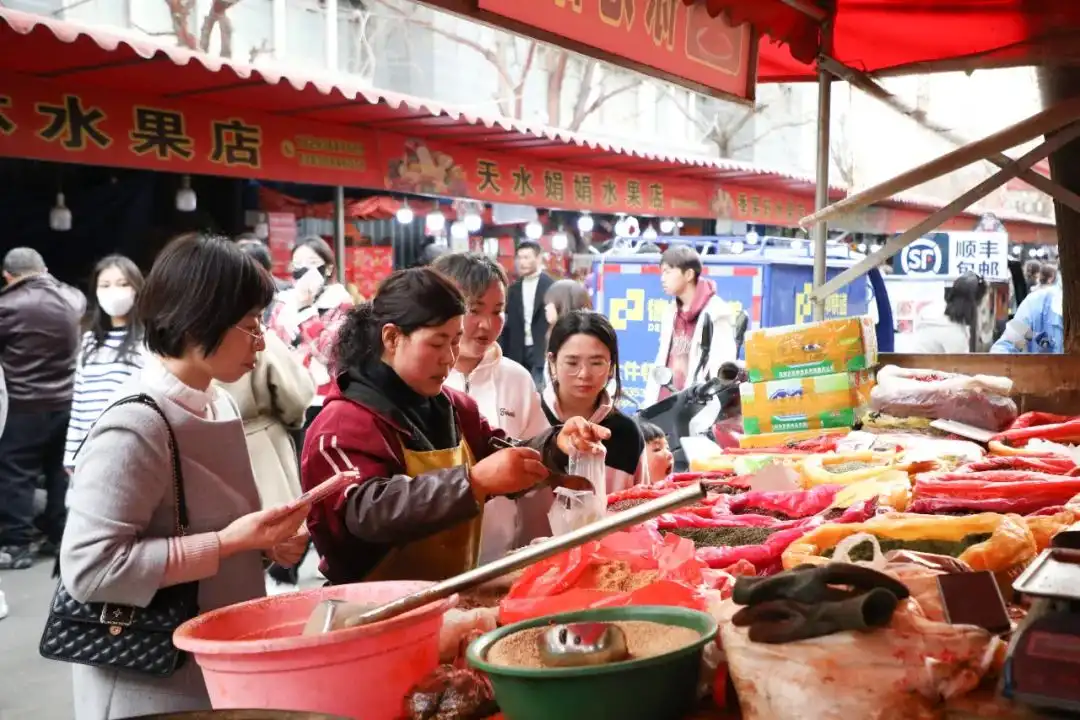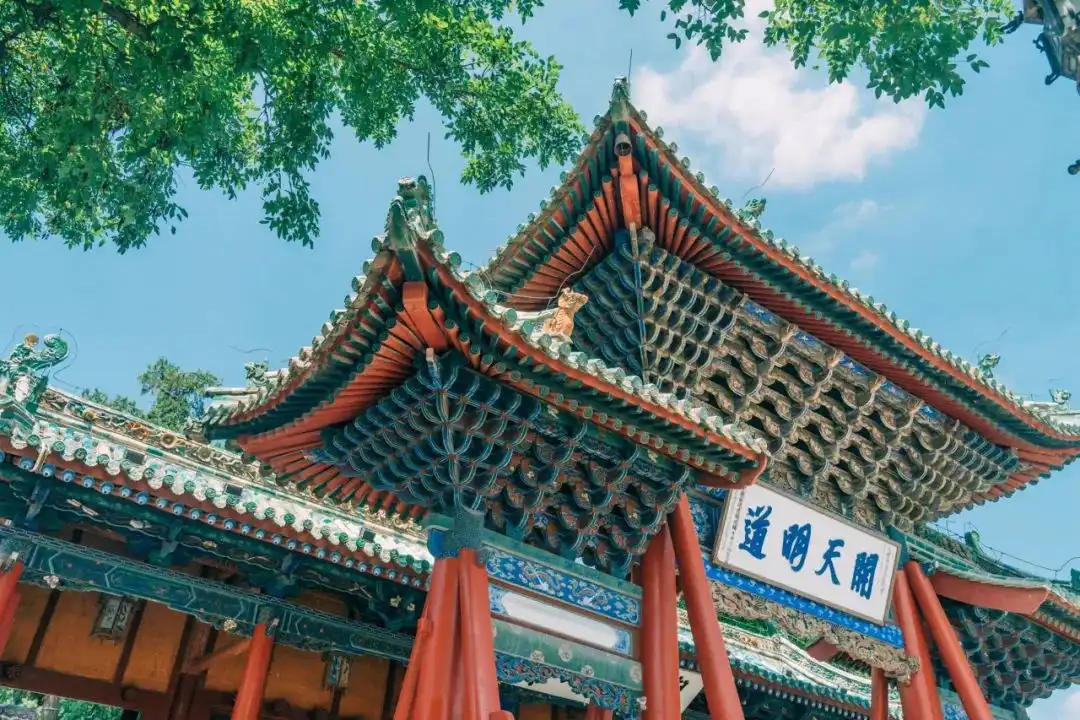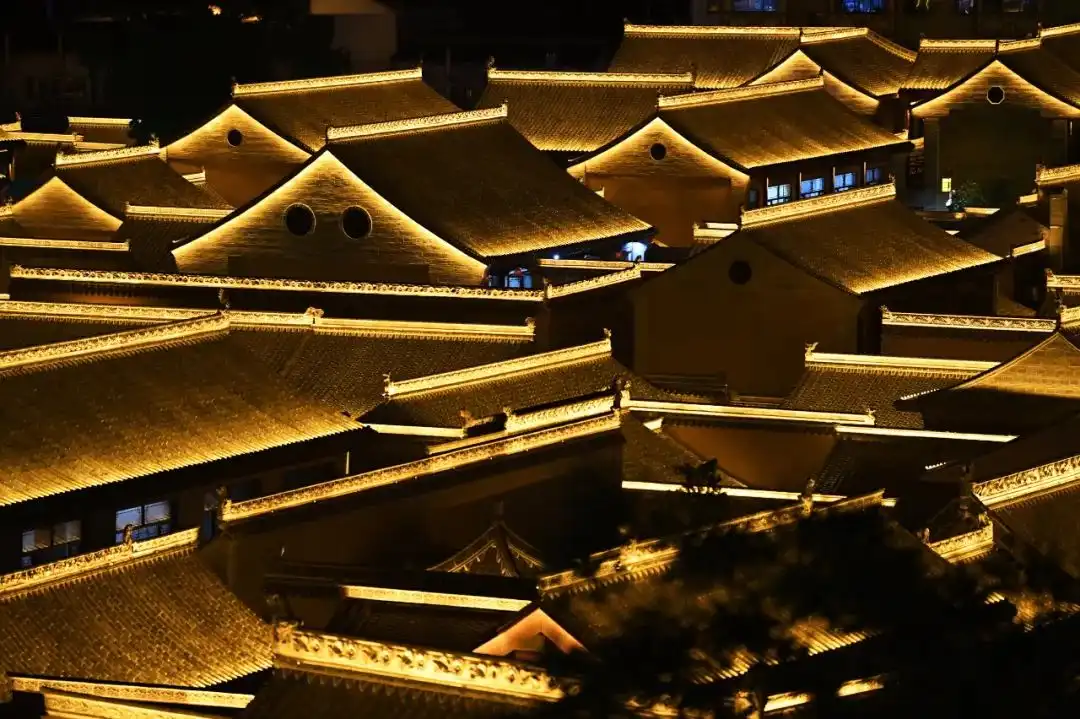A bowl of malatang is popular with the thick Tianshui of "five lines and three lines"
"Thousands of mountains and rivers, I love Tianshui." A month ago, this was just a cultural tourism slogan. In recent times, countless people have voted with their feet to make this sentence worthy of its name.
Tianshui, Gansu Province, a famous national historical and cultural city, has never imagined that it would become popular because of a bowl of malatang.

Maiji Mountain (Visual China) located in Tianshui City, Gansu Province
"Prosperous wealth" comes so suddenly. Just as its name suggests, hundreds of millions of Internet traffic flows to this northwest city like "water poured into the Tianhe River." some netizens tweeted:"The last time so many people came to Tianshui was more than 1700 years ago, when Zhuge Liang was on the Northern Expedition."
A city may become popular overnight, but the popularity does not fall from the sky for no reason. As one of the first cities to become popular in the Year of the Dragon, Tianshui, which people fell in love with, has its own loveliness.
Spicy taste 无数人带着问号来到天水,这里的麻辣烫到底有多好吃?排上几个小时的队,花上二三十元,吃完一抹嘴,确实香!此处省略3000字,因为成千上万的美食博主已经用自己天水之旅的味蕾体验,告诉了“粉丝”们答案。
Tianshui Malatang "won the horse" and won the "Soul Double Pepper". In the Shennong Materia Medica Classic, written in the late Eastern Han Dynasty, there is a record of "Qin pepper"; in the "Qi Min Yao Shu" of the Northern Wei Dynasty, there is a description of "Shu pepper originated from Wudu, and Qin pepper originated from Tianshui." This "pepper" has been passed down to this day and is Qin 'an pepper. "The grains are big and the peel is thick. Look at this raised oil gland, so it's fragrant..." Chat with Cai Linge, a senior engineer at the Forestry and Grassland Bureau of Qin 'an County, when he mentioned pepper, he took out his mobile phone to display pictures of various Qin' an pepper, with pride in his words:"The hemp taste is strong and the aroma is mellow!"
There is also a "pepper", which is Gangu pepper. More than 400 years ago, Gangu pepper was recorded in the "Fuqiang County Annals" compiled by Ye Yingjia during the Tianqi period of the Ming Dynasty. It was famous in Longshang as a court tribute in the late Ming and early Qing Dynasties. The unique natural conditions such as soil and climate give rise to the quality of Gangu pepper that is spicy but not dry, fragrant but not strong. The explosion of Tianshui Malatang this time also made Gangu Chili famous.
"Chili noodles on the market are generally 10 yuan per catty, while Gangu chili noodles can be sold for 20 to 30 yuan per catty. It is expensive because it is worth the money." He Zhibin is the general manager of Longshangjiao Agricultural Technology Co., Ltd. He claims to have "seen the world." Three years ago, he hired a leading anchor to "bring goods" and sold more than 10,000 chili noodles in a few minutes, but usually he can only sell three to four hundred orders in a day. "Recently, I have been receiving more than 10,000 orders every day and working overtime until midnight every day." Surprised? Are you surprised?

Tourists buy local specialties such as chili noodles at a snack street in Qinzhou District, Tianshui City. Photo by Ma Xiping (Xinhua Agency)
Tianshui Malatang "won the hemp", and the win lies in the ingenuity of production. Want to ask Tianshui people which spicy soup is delicious? The answer is generally that each has its own characteristics, and each family has its own ingredients. This is not only the case in urban areas, but in every county in Tianshui, people also have their own spicy hot cakes. For example, in Qin 'an County, Hongfang Malatang is people's first choice.
Wu Hongfang began to develop Malatang ingredients when she was 16 years old and opened a shop in Qin 'an County. With seven or eight tables and more than 50 square meters, before this wave of traffic arrived, her daily turnover could reach nearly 10,000 yuan. Wu Hongfang's secret was her own ingredients. "Use our local peppers, pepper and other seasonings, stir-fry them yourself, and sell them to other Malatang shops." In the 24 years since the store opened, Wu Hongfang's ingredients have been updated and the taste has been continuously improved. When someone came to learn, she also taught her everything she could.
Tianshui Malatang "won the hemp" and won the strong "sweet taste". In a bowl of malatang, the juice is the "soul" and the dishes are the "main body", concentrating the flavor of Gansu. There are not only "double pepper", but also Dingxi Kuanfen, Lanzhou Plateau summer vegetables, Kang County fungus, Hexi Corridor mushroom... At the Dadiwan Cultural Site in Tianshui, China's earliest dry farming crop millet specimens were unearthed. More than 7000 years ago, the ancestors of Dadi Bay were already engaged in agricultural production. Farming civilization has lasted for thousands of years, and today a rich system of "sweet" agricultural products has been formed, making Gansu an important base for the country's "Western cuisine to the east" and "Northern cuisine to the south".
Who can refuse the aroma of high-quality ingredients? Who wouldn't love the taste that has been passed down for thousands of years?
Thick and kind 甲辰龙年第一座网红城市是龙城天水。人们来到天水,是因为对麻辣烫的一见钟情或者“网恋”;但深爱天水,绝不只是因为麻辣烫。
There is a poem that is very popular:However, if you make Longcheng fly generals, you will not teach Huma to cross Yinshan. The "Dragon City" mentioned in the poem is Tianshui, the hometown of Li Guang, the "Flying General" of the Han Dynasty. Why is Tianshui nicknamed Longcheng? It is recorded in "Bu Shi Ji·Three Emperors Benji" that Huaxu "was born and sacrificed in Chengji", and Paoxi "had the body of a snake and the head of a man" and "had a dragon's auspicious sign, and he used the dragon to discipline an official, and was called the Dragon Shi." Ancient Chengji County was located in Tianshui."Paoxi" was an alias for Fuxi. The cultural accumulation of the Chinese nation's dragon totem made Tianshui also known as Dragon City.
Documents from past dynasties record that Fuxi had made achievements such as drawing eight trigrams, weaving nets, raising sacrifices, promoting kitchens, setting family names, making weddings, carving book deeds, and making a calendar. He was the pioneer of the early social production, lifestyle and social system of the Chinese nation., the founder. As the "Hometown of Emperor Xi", the Fuxi Ceremony held in Tianshui on June 22 every year has been included in the first batch of national intangible cultural heritage protection lists. It has become a unique and important cultural brand in Gansu Province and is also a major sacrificial ceremony for Chinese people at home and abroad.
During the Spring Festival this year, the "Little Ancestor" series of cultural and creative products launched by the Dadi Bay Museum set off a boom in museum tourism. The image creativity of "Little Ancestor" originated from the "head-shaped colored pottery bottle with the mouth of a human head" unearthed at the Dadi Bay site, and was highly consistent with the ancestor culture of Tianshui. In recent days, a "little ancestor" more than a person's height has come to the ancient city of Tianshui and invited babies from all over the country who come to Tianshui to eat spicy soup to experience Dadi Bay culture. If a cultural and creative product dares to be named "Little Ancestor", I'm afraid only Tianshui can.

A scene of Fuxi Temple in Qinzhou District, Tianshui City (Visual China)
When you come to Tianshui, you always go to Fuxi Temple to remember the ancient achievements of the ancestors of humanity, who opened the sky and enlightened the way and educated our ancestors; when you come to Tianshui, you always go to a museum to understand the historical context of the Qin ancestors 'expedition to the west, setting counties, and marching eastward to start businesses; When you come to Tianshui, you always climb the mountains and rivers and appreciate the romantic poem "The reeds are green, and the white dew turns to frost"; When you come to Tianshui, you always look for traces and reminisce about the past, and visit the ancient battlefield of" Wisdom Harvest Jiang Wei" and" Losing Street Pavilion" during the Three Kingdoms Period. When you come to Tianshui, you always have to visit the ancient temple grottoes and taste the Sanskrit sound of the Weishui River hidden among the green mountains...
When people come to Tianshui, what impressed people most was perhaps not the spicy hot soup with full color, aroma, or the dizzying cultural and tourism resources, but the enthusiasm and sincerity of Tianshui people. Prior to this, Tianshui's most famous smile was a statue of a little monk 1500 years ago in Cave 133 of Maijishan Grottoes. The shape was simple and simple, but it smiled innocently and was called the "Oriental Smile".
This smile is not sealed in the cave, but has been deeply integrated into the Tianshui people's hospitality for thousands of years. If you eat a bowl of malatang for 20 yuan, you can receive small gifts that far exceed its value; organize a special motorcade to receive tourists; free parking in the government compound, and volunteer services can be seen everywhere; a malatang food street was set up in two days, just to make "babies" queue up less...
The profound cultural heritage and the benevolent urban character jointly condense into Tianshui's thick urban heritage. Who can refuse a friendly smile? Who can not love a warm and simple city?
Fifth line, third line 这是一座“五线城市”。麻辣烫爆火之初,不少人怀疑:地处西北内陆的城市,能否接得住这“泼天的富贵”?网络上对“五线城市”的表述是,“经济欠发达的地级行政区,一般城市规模偏小,经济基础较差,大型企业数量有限……”即便如此,天水人也没让游客失望。因为爱这座城市,所以倾尽全力“招呼客人”。每个天水人都是这座城市的服务者、代言者,他们深知,正是因为“五线”,所以这样的机会对天水来说太难得了。接住了,接稳了,天水终有一天会摆脱“五线”。
This is another "third-tier" city. Tianshui became popular. Although 77-year-old Guo Shulian is in Beijing, she still clicks on the videos that have become popular on the Internet like a child opening her favorite gift. Tianshui is her "second hometown". More than 50 years ago, Guo Shulian and her colleagues rushed to this ancient city in the northwest and built Hailin Bearing Factory in the Liziyuan Valley of Tianshui, starting a period of "passionate years." This past event is cherished by many people as a "third-line memory".

Night view of Tianshui Ancient City. Photo by Chen Bin (Xinhua Agency)
In the 1960s, the country implemented the "three-line" construction strategy, and a number of large and medium-sized industrial enterprises under the central government moved from Beijing, Shanghai, Harbin, Changchun, Luoyang and other places to various places. Tianshui is listed as one of the "third-line" construction bases. 37 relocated and newly built enterprises have settled in Tianshui, forming an industrial system dominated by electrical appliances, machinery manufacturing, and electronic information, giving this ancient city pride and glory.
A bowl of malatang evokes the strong feelings of Tianshui and the flavor of Tianshui that they often miss; Tianshui has not forgotten that the foundation laid by the builders of the "third-line" is the vigorous driving force for the ancient city to rejuvenate.
Hailin Bearing Factory, which Guo Shulian participated in, is now China's largest supplier of tapered roller bearings and a backbone enterprise in the national bearing industry; Huatian Electronics Group, which evolved from Tianshui Yonghong Equipment Factory, has developed into a leading enterprise in the domestic integrated circuit packaging and testing industry; Tianguang Semiconductor Company's products have also been equipped with the country's important equipment of "seizing the moon in the nine skies and catching turtles in the five oceans", overcoming dozens of "stuck neck" technologies...
Some people vividly described it as saying that people came for Malatang, but only after eating it did they realize that the Malatang was served in a "golden bowl". Who can refuse the opportunity to make their hometown famous? Who can not love a city with feelings?
A bowl of malatang makes people speak out their common aspirations:I love Tianshui!
